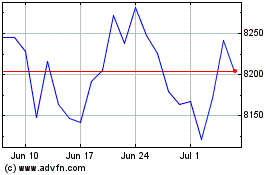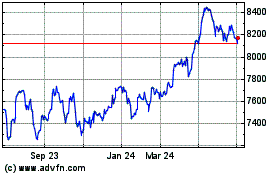By Paul Vigna and Will Horner
U.S. stocks slipped Wednesday as economic data suggested
consumers were holding back on spending in the face of trade
tensions and a global economic slowdown.
The Dow Jones Industrial Average fell 22.82 points, or 0.1%, to
27001.98. The S&P 500 dropped 5.99 points, or 0.2%, to 2989.69,
led by the energy sector, which declined 1.5%. The Nasdaq Composite
lost 24.52 points, or 0.3%, closing at 8124.18.
Data from the Commerce Department Wednesday showed that U.S.
retail sales slipped 0.3% in September, missing the expectations of
economists polled by The Wall Street Journal who had predicted a
0.2% increase.
That further fueled anxiety about growth in the U.S. and
overseas. The International Monetary Fund this week cut its global
GDP forecast for 2019 to just 3%, its lowest level since the 2008
financial crisis, citing trade tensions and geopolitics. It
projected 3.4% growth in 2020.
"Right now, you're not getting any relief from this trade war,"
said Edward Moya, an analyst at forex brokerage Oanda. "Until there
is something that is signed and something the market believes is
achievable, you're not going to see any forecasts have any
upgrades."
Investors continue to scrutinize the details of the "phase one"
trade deal reached between the U.S. and China last week. Despite a
Chinese promise to buy more U.S. farm products, questions remain
over how much, the time frame for purchases, and what the U.S.
might have to give in return. The U.S. still plans to impose new
15% tariffs on $156 billion in consumer goods starting Dec. 15.
Uncertainty over the trade war and the global economy is
prompting companies to trim their growth expectations, according to
the Federal Reserve's "beige book," which was released Wednesday
afternoon. Some manufacturing companies cut head count. Some
companies cut worker hours.
"That could be the transmission channel in which the slowdown
intensifies," said Ben May, the director of global macro research
at Oxford Economics.
Despite those worries, major U.S. stock indexes remain near
all-time highs, and a strong earnings reports drove gains in many
individual stocks.
Bank of America shares rose 44 cents, or 1.5%, to $30.17 as the
bank reported gains in its consumer, wealth and commercial
businesses. PNC Financial Services Group, Bank of New York Mellon
and U.S. Bancorp also rose after reporting results.
After markets closed, shares of Netflix rose 9.3% after the
company reported fewer new subscribers than expected but revenue
and earnings that rose sharply from a year ago. Meanwhile, IBM
dropped 3.4% after reporting profit fell 38%.
In other corporate news, shares of McKesson, AmerisourceBergen
and Cardinal Health rallied after The Wall Street Journal reported
they were in talks to settle opioid crisis litigation.
Despite the downbeat report on consumer spending,
consumer-related stocks ticked higher. General Motors rose 39
cents, or 1.1%, to $36.65 on reports of a tentative deal with its
striking union workers. Advance Auto Parts and BorgWarner rose
nearly 2%
U.S. crude oil added 1% to $53.36, gold gained 0.7% $1,493.50,
and the yield on the U.S. 10-year Treasury note fell to 1.75% from
1.77% on Tuesday.
Overseas, the pan-continental Stoxx Europe 600 fell 0.1% as
talks toward a draft plan for Britain to leave the European Union
continued. Investors had been anticipating positive news to emerge
overnight but were disappointed by a lack of progress Wednesday,
said Peter Dixon, a senior economist at Commerzbank.
"We were told there would be a deadline of midnight last night;
both sides sounded very positive. Then we woke up and it was still
a work in progress and I think that has changed investors'
perceptions of where we are," he said.
The British pound continued climbing, rising 0.3%, while the
FTSE 100 gauge for U.K. equities slipped 0.6%.
Chinese stocks edged lower on concerns that tensions with the
U.S. over the Hong Kong protests would make striking a trade deal
more complicated.
The Shanghai Composite Index fell 0.4% after the U.S. House of
Representatives passed a series of bills backing pro-democracy
protesters in Hong Kong, drawing a strong rebuke from China. A
Chinese Foreign Ministry spokesman warned the U.S. against meddling
in Chinese affairs and said the bill would damage relations between
the two nations.
The development may complicate efforts to reach a trade
agreement, analysts said.
"We got sideswiped by those headlines from China," said Stephen
Innes, a market strategist for currency broker AxiTrader in
Bangkok. "I'm not sure much is going to actually come from it, but
it's just another thing to deal with."
Write to Paul Vigna at paul.vigna@wsj.com
(END) Dow Jones Newswires
October 16, 2019 16:54 ET (20:54 GMT)
Copyright (c) 2019 Dow Jones & Company, Inc.
FTSE 100
Index Chart
From Mar 2024 to Apr 2024

FTSE 100
Index Chart
From Apr 2023 to Apr 2024
